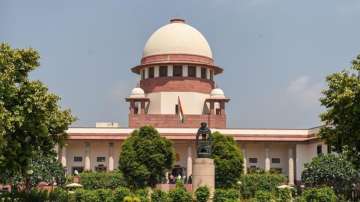The Nirmohi Akhara, one of the Hindu parties contesting the Ayodhya title dispute and claiming to be "only friend" of the deity at the makeshift Ram temple, has told the Supreme Court that it should be given the possession of the disputed site.
The Akhara is making the claim, saying it is the 'Shebait', a person who serves the deity in a temple. The assertion was made during the day to day hearing of the Ayodhya title dispute.
The Akhara claims the deity is legally recognized as a minor. Therefore, it has a valid ground to represent the deity in this dispute, and the issue of 'Shebait' is also necessary to decide the issue of relief of restoration from the receiver.
The order of attachment, charge and possession of inner courtyard was taken by a court-appointed Receiver on July 5, 1960, from the Mahants and priests of Nirmohi Akhara. The hearing took an interesting turn on Friday when the Akhara's counsel insisted that it is contesting the suit filed by 'Ram Lalla Virajman'. The court inquired if it was contesting this suit and if so, it might go against the deity's title and cause the dismissal of the suit of the deity.
"The deity was always there, then where does this question of Ram Lalla Virajman arise? We are not challenging the title of the deity, but only that the next friend cannot institute any suit on behalf of the deity when we as bonafide Shebait already did it," said Kartick Chopra, spokesperson for Nirmohi Akhara.
In the Ayodhya dispute, suit has been filed by worshipers or next friend of deity, which has been objected by the Akhara, which says that "a worshiper or a next friend merely acts as a disinterested person for and on behalf of the deity but cannot receive possession of the property belonging to the deity".
The counsel of Akhara also told the Supreme Court the suit no. 5 of 1989 cannot be maintained on behalf of the deities by plaintiff no.3, D.N. Aggarwal, as a next friend, as it was wholly inapplicable.
Senior advocate Sushil Jain, appearing for the Nirmohi Akhara, had submitted that Ram Lalla, the deity, the plea was made in 1989 but the Akhara had been in possession of the property since 1934.
"I have taken a plea that the decree in the interest of the deity can only be given in the favour of Akhara, which is the Shebait," argued Jain before a Constitution bench headed by Chief Justice Ranjan Gogoi.
During the arguments, Jain insisted the birthplace of Lord Ram is not a juridical person, subject to law, as argued by other lawyers. According to the Akhara's written statement: "Akhara (suit No.3 1989) has claimed right as Shebait/manager of the Ram Janamsthan, as well as the idols of Lord Ram, Lakshman, Hanuman and Saligram installed in the disputed structure, which is described as the main temple and referred as inner courtyard".
In 2010, the Allahabad High Court, in its verdict on four civil lawsuits, had partitioned the 2.77-acre disputed land equally among the three parties: Ram Lalla, Nirmohi Akhara and Sunni Waqf Board.
Jain said the Hindu body was claiming its possession and right to manage the daily affairs of the deity, which includes the right to re-construct the Ram temple, as the servant of the deity, and not at all claiming the title of the property.
The court inquired Jain to establish its Shebait right through documentary and oral evidence. Jain replied its claim as Shebait has not been challenged by any other party in the dispute. On Friday, Jain read out cross-examination of its two witnesses establish Akhara's claim before the bench.
The Akhara claims the Janmasthan, as well as the deities, have been in existence from time immemorial and the Allahabad High Court had also found that it had been in existence at least from 1734 AD.
In its written submissions, the Akhara states it is the only institution in the immediate nearby vicinity in the outer courtyard, which land-locks the inner courtyard where there is only the presence of one entity, Akhara. On Monday, the Nirmohi Akhara will continue with its arguments.
WATCH THIS VIDEO: Special report| Watch what Ayodhya's muslim think about Rama Temple
Latest India News
